|
Aleister Crowley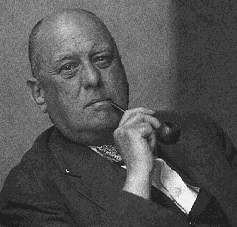 Sometimes the legend is greater than the reality.
Sometimes the legend is greater than the reality.In the case of Aleister Crowley, the truth of that statement is a testament to the magnitude of the legend, since the reality is pretty remarkable. A study in contradictions, Crowley was a pioneering mountain climber, a pioneering homoerotic poet, a pioneering ritual magician, a heroin addict (not so pioneering), a sleazy womanizer, a closet homosexual, a vocal feminist, a racist, a German collaborator, a British secret agent, a civil rights advocate, a talented amateur artist, a legitimately profound mystic and an infuriating charlatan. But was he the wickedest man on Earth? Ehhhhh... It's kind of tough to compete with Adolf Hitler or Idi Amin, you know? Born in England in 1875 with the name "Edward Alexander," Crowley burst into the world with a bad attitude during the most repressed period in the repressed history of the most repressed nation in the world. For several years, young Crowley grudgingly went along with the program, idolizing his father, a preacher and pamphleteer for an Protestant evangelical sect that made the Victorian era's repression look positively libertine. But his father died when Crowley was a pre-teen. The trauma of loss combined with a disagreeable stepfather and a surge of pubescent hormones to unleash the "Great Beast" on the world. Rotting Poetry or Just Rotten?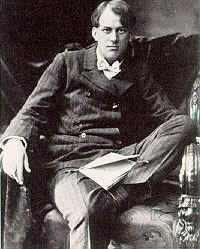 Crowley was a sickly child, and his stepfather introduced him to the outdoors in an effort to build his health. As a Cambridge undergraduate, this interest expanded to mountaineering. He took part in an early historic, record-breaking attempt to scale K2 in the Himalayas, among other expeditions, where he developed a reputation for sadistically abusing the local help (which he later justified in that patronizing, racist colonial manner that made the British so beloved around the world). He also developed a reputation for unreliability, and his mountain treks were marred by a couple of ugly incidents in which people died.
Crowley was a sickly child, and his stepfather introduced him to the outdoors in an effort to build his health. As a Cambridge undergraduate, this interest expanded to mountaineering. He took part in an early historic, record-breaking attempt to scale K2 in the Himalayas, among other expeditions, where he developed a reputation for sadistically abusing the local help (which he later justified in that patronizing, racist colonial manner that made the British so beloved around the world). He also developed a reputation for unreliability, and his mountain treks were marred by a couple of ugly incidents in which people died.
At Cambridge, Crowley also discovered that he was gay. This realization didn't sit well with the Beast, who in a lifetime of hedonism and debauchery never quite managed to shake off the shame that his early upbringing instilled in him. He kept his homosexual adventuring a carefully guarded secret for most of his life, overcompensating with a pattern of continual womanizing that was also shaped in part by his burgeoning philosophical beliefs. But young Crowley's shame didn't stop him from becoming a prolific author of pioneering homoerotic poetry, cleverly disguised in metaphors and oblique verbiage such as the following excerpt from the cryptically named collection "White Stains" (Subtle!):
Touch me; I shudder and my lips turn back "White Stains," which alone would be enough to distinguish Crowley's name for posterity, was privately published under a pseudonym in 1898 and almost immediately banned. Legend has it that the covers on the original printing of 100 copies were adorned with white stains issued from the loins of the Beast himself. Most copies were eventually destroyed by British authorities, due to its content, which included odes to homosexuality, pedophilia, Bestiality and necrophiliac cannibalism:
Crowley was never known to play well with others, and he didn't play well with his fellow Golden Dawn members. Crowley at first befriended the leader of the Golden Dawn, MacGregor Mathers, then later turned on him, a pattern which would repeat itself endlessly through Crowley's life. After a series of petty melodramas, Crowley was expelled from the Golden Dawn after about two years. He engaged in a series of "magical battles" with Mathers, who left the order in disgrace after it was discovered (shockingly) that he had forged the "ancient" texts the sect was based on. The magical battles lacked the kind of Hollywood flair you'd like to see, with Crowley and Mathers being the only actual witnesses to the workings of the conflict, which apparently involved a lot of summoning and dispatching of demons and the like. Over the next several years, Crowley continued his spiritual explorations while traveling the world and engaging in the occasional mountaineering expedition. His ideas about magic and mysticism began to congeal. He married Rose Kelly, the sister of a friend, in 1893, and the two traveled together. With Rose in tow, the most significant period of Crowley's life was upon him. During a museum visit in Egypt, Rose found herself drawn to an ancient Egyptian artifact with the exhibit number 666, which depicted the Eygptian deities Hadit and Ra-Hoor-Khuit. Shortly after this encounter, Rose was overcome by the spirit of an entity known as Aiwass, who dictated "The Book of the Law" to Crowley over the course of three days. Whether mystically transmitted or an act of creative excess, the Book of the Law is a remarkable document. In cryptic and poetic terms, the book lays out a kind of scriptural framework for a spiritual path called Thelema, the Greek word for "will." The most famous line in the book, while derivative of previous spiritual writings, would forever be associated with Crowley: "Do what thou wilt shall be the whole of the law." With these 11 words, the course of Crowley's life was set. Complex Messiah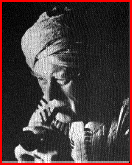 The Book of the Law is heavy on poetry, but light on theology. It generally encourages a libertine approach to life, the use of "strange drugs" and various obscure adjurations like "Let my servants be few & secret" and "Choose ye an island!"
The Book of the Law is heavy on poetry, but light on theology. It generally encourages a libertine approach to life, the use of "strange drugs" and various obscure adjurations like "Let my servants be few & secret" and "Choose ye an island!"
Crowley would maintain throughout his life that "Do what thou wilt" was not intended as a blanket permission for all sorts of depraved behavior (yeah, right), but rather an instruction that people should learn and discover their "true wills," the important works and desires of their lives, and follow through on them. Despite a mile-wide streak of self-aggrandizement, Crowley never attempted to claim authorship of the Book of the Law. He steadfastly maintained it had come from beyond and that his role was strictly that of interpreter. However, he did go so far as to designate himself as the only person worthy of interpreting the book, and he expected his followers (such as they were) to treat his views as seriously as Catholics treat a load of papal bull. Crowley believed the transmission of the Book of the Law signaled the imminent arrival of the Aeon of Horus, basically a new era in the evolution of humanity and religion in which the law of Thelema ("do what thou wilt") would be the prevailing system of belief. A few years later, Crowley formed a new magical order, his first effort to put the teachings of Thelema before the public. The Astrum Argentium (Silver Star) attracted some interest in its early stages, but never really caught on as broadly as, say, Mormonism. The A.A.'s primary claim to fame was the publication of Crowley's Equinox. The Equinox was a book-length periodical, published irregularly over the years, in which Crowley and affiliated individuals wrote an exhaustive and often brilliant updating of traditional magical and occult practices. The Equinox debuted with a bang by publishing several secret texts of the Golden Dawn, which he had sworn a solemn and reprisal-laden oath to protect. The move finalized his rancorous split with the group, infuriating its remaining members (who already hated him), such as the poet William Butler Yeats and Arthur Edward Waite (who achieved widespread fame for his Tarot studies). The A.A. enjoyed some modest success, and continues to this day, but Crowley's attention span wasn't exactly renowned as heroic. He moved on, leaving his wife, the A.A. and the Equinox behind. Crowley spent years traveling the world and studying esoteric systems, creating a body work which has never really gotten the credit it deserved. He wrote landmark analyses and translations of ancient texts about yoga, mediation and the I-Ching. Crowley also studied the interrelation of magical and spiritual systems around the world, borrowing liberally from extremely diverse sources and he continued to build Thelema in an almost coherent religion. Thelema evolved along the lines of the ceremonial magic traditions which had first shaped Crowley's thinking, namely rituals and procedures designed to elevate spiritual aspirants in both power and wisdom via astral projection, the casting of spells to advance the caster's true will, and the invocation of various spirits, angels, demons, entities, and/or whatever. Ordo Templi Orientis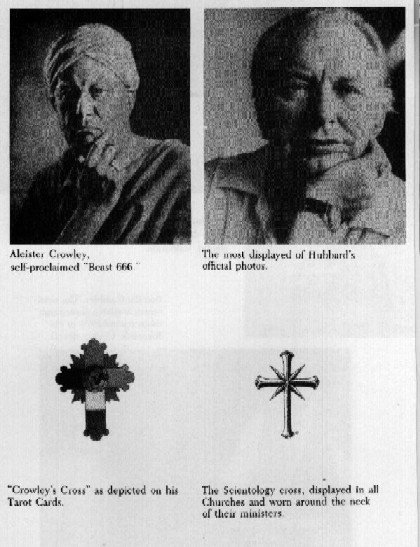 Crowley was approached by the Ordo Templi Orientis, which invited him to take on a leadership role. The OTO claims to integrate "Freemasonic, Rosicrucian and Illuminist movements of the 18th and 19th centuries, the crusading Knights Templar of the middle ages and early Christian Gnosticism and the Pagan Mystery Schools."
Crowley was approached by the Ordo Templi Orientis, which invited him to take on a leadership role. The OTO claims to integrate "Freemasonic, Rosicrucian and Illuminist movements of the 18th and 19th centuries, the crusading Knights Templar of the middle ages and early Christian Gnosticism and the Pagan Mystery Schools."
The leader of the OTO was a German named Theodor Reuss, a former Freemason and Illuminatus. He initiated Crowley into the sect in 1910 and in 1912 granted the Beast a charter to launch a British branch of the secret society. Crowley moved to the United States in 1914, at the onset of World War I, setting up shop in New York. In New York, Crowley continued recruiting students and began rewriting the charters of the O.T.O. to better suit his beliefs. Starting from a base structure very similar to the Freemasons, Crowley added several significant elements to the OTO's repetoire. He legalized the initiation of women into its ranks, wrote modernized English-language rituals for its members, streamlined initiation and degrees to more quickly advance members through the ranks, and integrated Thelema into the OTO's core mission, placing the Book of the Law at the center of its teachings. In the early 1920s, Crowley took control of the O.T.O. under ambiguous circumstances. Reuss allegedly suffered a stroke in 1920, an assertation which Crowley used to politick his way to the top of the hierarchy. He was the titular head of the OTO until his death in 1947. One of Crowley's most-lasting (but entirely unintended) contributions to the world of religion came from one of the OTO's American branches, led by self-proclaimed "Antichrist Superstar" Jack Parsons. Parsons ran a California OTO lodge that attracted a young L. Ron Hubbard as an aspirant. According to OTO lore and various biographies, Hubbard allegedly joined the group and engaged in an affair with Parsons' mistress (with Parsons' knowledge). Knowing a good thing when he saw it, Hubbard made off with the girl, a substantial amount of Parsons' cash (allegedly), and several major tenets of Thelema, which he re-metaphorized into the big-budget, George-Lucas-on-crack, metaphysical framework of Scientology (allegedly), a religious enterprise (allegedly) renowned for its (alleged) litigiousness (allegedly, allegedly, allegedly). In later years, Hubbard would (allegedly) claim Crowley was a "good friend" but Crowley's biographers do not record a meeting between the two. House of HorrorsCrowley's world travels are too voluminous to detail here; he managed to wear out his welcome in country after country. But a notable stop on his itinerary was the small Sicilian island town of Cefalu, one of the more colorful periods of Crowley's life.With his mistress of the moment, Crowley set up shop in a house in Cefalu which he dubbed the "Abbey of Thelema." He imagined it as a headquarters from which the doctrines of Thelema would be spread throughout the world. In practice, it was somewhat less impressive. For three years, Crowley and a motley assortment of followers set up shop in the Abbey, which visitors described as a hygienic nightmare, rife with the stink of shit. Crowley adorned the walls with often grotesque murals and paintings of various occult subjects. Several accounts described the sacrifice of small animals in magic rituals, and Crowley often set out to systematically degrade visiting pupils (not least with his sexual attentions). The truth was bad enough, but once the British tabloids caught wind of these tales, they decided the stories some embellishment. The "wickedest man in the world" appellation which made Crowley famous came from the headlines on these stories of murder, black magic, the live sacrifice of babies, bestiality and wanton seduction. Crowley somehow managed to revel in the tales while at the same time suing for libel in the hopes of scoring some easy cash. Aleister Crowley, Secret AgentIt was in New York that Crowley really began to cement his reputation as an evil guy. In what he would later claim was an act of sabotage, Crowley wrote pro-German propaganda for a New York publisher which, he explained, was intended to hurt the Germans by making them look ridiculous for having such bad propaganda written for them. In one stroke, he turned his bad prose and treasonous leanings into a victory for freedom and democracy.There is no proof as to whether Crowley was a) sincerely trying to sabotage the Germans and b) working for British intelligence in this effort, as he claimed. Crowley counted some fairly significant British military figures among his students. "It could have happened" is about as far as you can reasonably go. Crowley's flirtation with Aryan supremacy didn't end with WW I, however. During World War II, a member of the OTO wrote to Adolf Hitler on behalf on Crowley, suggesting that Thelema would be a dandy choice as the national religion of the Third Reich. His German disciple tried to give Hitler a copy of the Book of the Law. It has never been proved that such a thing happened. We must resort once more to "It could have happened." Conspiracy lovers enjoy few things more than a good Crowley-Nazi story, and there are plenty of them in circulation, but little evidence any of them actually ever happened. Claims of meetings between der Furher and der Beast and of Nazi black magic rituals appear to have been greatly exaggerated. Decline and Fall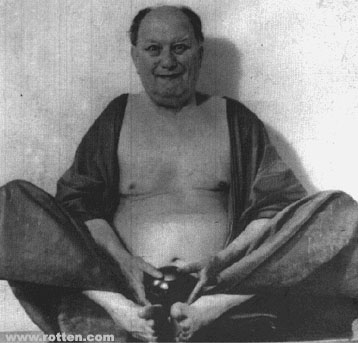 After squandering his considerable inheritance on sex, drugs and vanity publishing (mostly the latter), Crowley took to supporting himself through an innovative pattern of publishing and relationships.
After squandering his considerable inheritance on sex, drugs and vanity publishing (mostly the latter), Crowley took to supporting himself through an innovative pattern of publishing and relationships.
Firmly ensconced in his role as the most evil man in the world, Crowley published a few tell-all autobiographical tale such as his notorious "Confessions" and "Diary of a Drug Fiend." The problem with this method of self-sufficiency was that his books were banned almost as quickly as they could be printed, which made royalties somewhat problematic, even though the advances were nice. Given his chronic failure to make it in publishing, the Beast had to find other sources of incomes. He took to seducing women of moderate to substantial means, while recruiting male students who could do the actual work of promoting the Beast's religious and literary aspirations. The male students were as likely to become the object of Crowley's amorous attentions as the mistresses. Invariably, Crowley tired of the women and the men tired of him, but rinse, lather and repeat enough times, and pretty soon you've managed to support yourself for a lifetime. Crowley's health declined into the 1930s and '40s, in no small part due to a lifelong heroin habit. After his homosexuality, the only other thing that ever really shamed Crowley was his inability to quit the drug, despite repeated attempts. His health declining, the Beast shambled off to spend his final days mostly alone, at a boarding house in his native England. On December 1, 1947, with a parting curse on the doctor who refused to prescribe him any more heroin, Crowley passed on to the great unknown. Depending on how many of the extravagant claims made about the Beast (by himself and others) you want to believe, feel free to make your own calculations about where his karma deposited him on December 2.
|
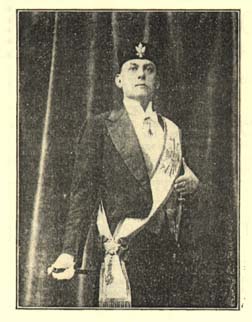
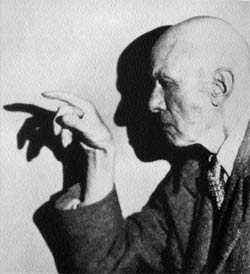
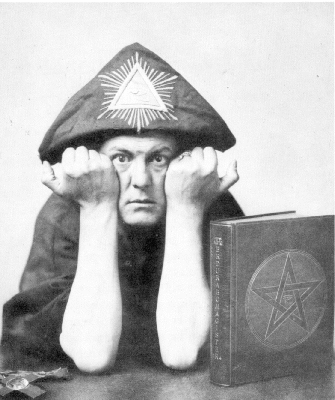 Having, um, conquered the worlds of mountaineering and literature, Crowley found his attention increasingly turning to matters spiritual. Through his mountaineering contacts, Crowley made contact with members of the Hermetic Order of the Golden Dawn, an occult secret society. The Golden Dawn was an offshoot of the
Having, um, conquered the worlds of mountaineering and literature, Crowley found his attention increasingly turning to matters spiritual. Through his mountaineering contacts, Crowley made contact with members of the Hermetic Order of the Golden Dawn, an occult secret society. The Golden Dawn was an offshoot of the